初中英语最全英语介词用法
初中英语介词用法 课件

in后常接年,月,日期,上午,下午 ,晚上,白天,季节,世纪等
● in 2006(2006年) ● in May,2004 (2004年五月) ● in the morning (早晨/上午),in the afternoon (下
午),in the evening (晚上), ● in the night (夜晚),in the daytime (白天), ● in the 21st century (21世纪) ● in three days (weeks/month)三天(周/个月) ● in a week (一周) ● in spring (春季)
A. to; on B. to; in C. by; on D. for; on
★ at表示时间点(在几点,中午;午夜;夜里;某日期)
如:at sunrise; at weekend; at Christmas ; 在圣诞节期间
★ on 表示在具体的某一天或某天的上午,下午,晚上及星期等
如:on Monday morning, on Christmas day ; 在圣诞节当天
时间介词的用法:
at后常接几点几分,天明,中午,日 出,日落,开始等
● at five o’clock (五点) ● at dawn (黎明) ● at daybreak (天亮) ● at sunrise (日出) at sunset (日落) ● at noon (中午) ● at midnight (半夜) ● at the beginning of the month (月初) ● at that time (那时) ● at that moment (那会儿) ● at this time of day (在一天的这个时候)
初中英语介词用法
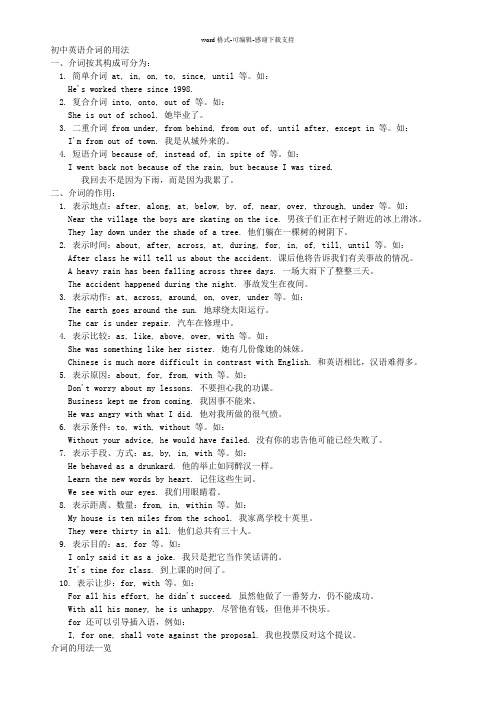
初中英语介词的用法一、介词按其构成可分为:1. 简单介词 at, in, on, to, since, until 等。
如:He's worked there since 1998.2. 复合介词 into, onto, out of 等。
如:She is out of school. 她毕业了。
3. 二重介词 from under, from behind, from out of, until after, except in 等。
如:I'm from out of town. 我是从城外来的。
4. 短语介词 because of, instead of, in spite of 等。
如:I went back not because of the rain, but because I was tired.我回去不是因为下雨,而是因为我累了。
二、介词的作用:1. 表示地点:after, along, at, below, by, of, near, over, through, under 等。
如:Near the village the boys are skating on the ice. 男孩子们正在村子附近的冰上滑冰。
They lay down under the shade of a tree. 他们躺在一棵树的树阴下。
2. 表示时间:about, after, across, at, during, for, in, of, till, until 等。
如:After class he will tell us about the accident. 课后他将告诉我们有关事故的情况。
A heavy rain has been falling across three days. 一场大雨下了整整三天。
The accident happened during the night. 事故发生在夜间。
初中英语介词的用法总结
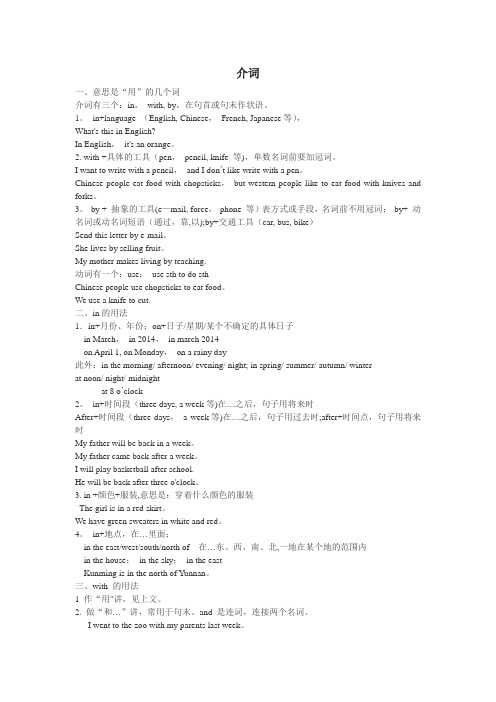
介词一、意思是“用”的几个词介词有三个:in,with, by,在句首或句末作状语。
1。
in+language (English, Chinese,French, Japanese等),What's this in English?In English,it's an orange。
2. with +具体的工具(pen,pencil, knife 等),单数名词前要加冠词。
I want to write with a pencil,and I don’t like write with a pen。
Chinese people eat food with chopsticks,but western people like to eat food with knives and forks。
3。
by + 抽象的工具(e—mail, force,phone 等)表方式或手段,名词前不用冠词;by+ 动名词或动名词短语(通过,靠,以);by+交通工具(car, bus, bike)Send this letter by e-mail。
She lives by selling fruit。
My mother makes living by teaching.动词有一个:use;use sth to do sthChinese people use chopsticks to eat food。
We use a knife to cut.二、in的用法1.in+月份、年份;on+日子/星期/某个不确定的具体日子in March,in 2014,in march 2014on April 1, on Monday,on a rainy day此外:in the morning/ afternoon/ evening/ night; in spring/ summer/ autumn/ winterat noon/ night/ midnightat 8 o’clock2。
初中英语全部介词整理
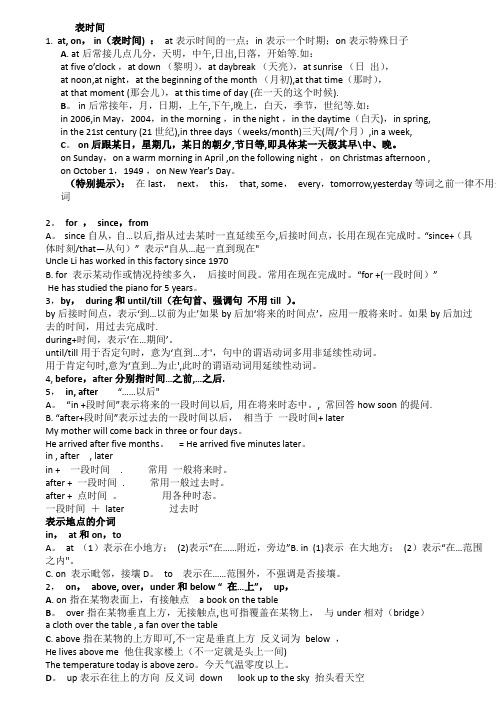
表时间1.at, on, in(表时间) :at表示时间的一点;in表示一个时期;on表示特殊日子A. at后常接几点几分,天明,中午,日出,日落,开始等.如:at five o’clock,at down (黎明),at daybreak (天亮),at sunrise (日出),at noon,at night,at the beginning of the month (月初),at that time(那时),at that moment (那会儿),at this time of day (在一天的这个时候).B。
in后常接年,月,日期,上午,下午,晚上,白天,季节,世纪等.如:in 2006,in May,2004,in the morning ,in the night ,in the daytime(白天),in spring,in the 21st century (21世纪),in three days(weeks/month)三天(周/个月),in a week,C。
on后跟某日,星期几,某日的朝夕,节日等,即具体某一天极其早\中、晚。
on Sunday,on a warm morning in April ,on the following night ,on Christmas afternoon ,on October 1,1949 ,on New Year’s Day。
(特别提示):在last,next,this,that, some,every,tomorrow,yesterday等词之前一律不用介词2。
for ,since,fromA。
since自从,自…以后,指从过去某时一直延续至今,后接时间点,长用在现在完成时。
“since+(具体时刻/that—从句)” 表示“自从…起一直到现在"Uncle Li has worked in this factory since 1970B. for 表示某动作或情况持续多久,后接时间段。
初中英语语法总结:方位介词(有答案)
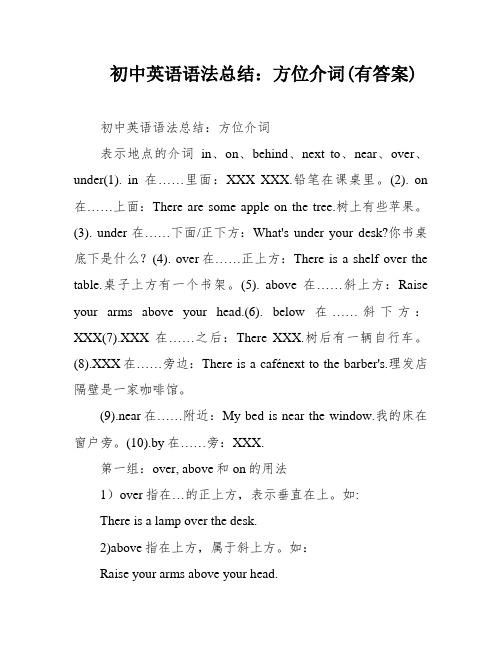
初中英语语法总结:方位介词(有答案)初中英语语法总结:方位介词表示地点的介词in、on、behind、next to、near、over、under(1). in在……里面:XXX XXX.铅笔在课桌里。
(2). on 在……上面:There are some apple on the tree.树上有些苹果。
(3). under在……下面/正下方:What's under your desk?你书桌底下是什么?(4). over在……正上方:There is a shelf over the table.桌子上方有一个书架。
(5). above在……斜上方:Raise your arms above your head.(6). below在……斜下方:XXX(7).XXX在……之后:There XXX.树后有一辆自行车。
(8).XXX在……旁边:There is a cafénext to the barber's.理发店隔壁是一家咖啡馆。
(9).near在……附近:My bed is near the window.我的床在窗户旁。
(10).by在……旁:XXX.第一组:over, above和on的用法1)over指在…的正上方,表示垂直在上。
如:There is a lamp over the desk.2)above指在上方,属于斜上方。
如:Raise your arms above your head.3)on指在上面,表示两物体接触。
如:There is a cup on the table.第二组:under / below的用法:1) under在……上面/正下方:What's under your desk?2) below在……斜下方:XXX.操演:() 1 The boat is passing___ the bridge.A. XXX() 2 Two planes are flying___ the city.A. XXX, below() 3 We can see a river running to the east____ the XXX() 4 Do you see the kite ___ the building.A. XXX参考谜底C B B D第三组:in和on透露表现“在……上”门一类——镶嵌在墙里的,用in书画一类——挂在墙面上的,用on() 1 He put up a map ___ the back wall because there was a hole ___ it.A. on; onB. at; inC. on; inD. on; at() 2 There is a door___ the wall.A. XXX() 3 Any man ___ eyes______ his head can see that he'XXX.A. with; onB. with; inC. on; withD. in; with鸟一类落在树上的,用in;XXX一类长在树上的,用on() 1 There are some birds singing___ the trees.A. XXX() 2 There are so many apples___ that tree.A. inB, XXX第四组:XXX表示“接壤”第四组:XXX表示“接壤”BABAB在A里——用inA和B相邻(接壤)——用onABA和B不相邻(不接壤)——用to练() 1 The United States is ____ the south of Canada and ___ the east of Japan.A. to; inB. on; toC. in; besideD. at; on() 2 The man stood ____the window, XXX() 3 Japan lies____ the east of China.A. XXX参考答案B B B B第五组:at, in表示“在……”1)at透露表现较小的地址。
初中英语语法总结:一词多义的介词in、of、to、with

初中英语语法总结:一词多义的介词in、of、to、with1. ina. 表示情况、状态,意思是“处在……中”in surprise惊讶地in a hurry 匆匆地b. 表示手段、形式、方式,意思是“以、用”stand in line 站成排in a tired voice 用疲倦的声音in English 用英语In this way 用这个方法c. 表示服饰等,意思是“穿着、戴着”Lucy is in the yellow hat露茜戴着黄色的帽子。
d. 表示范围、领域,意思是“在……方面”She does well in making model planes.她擅长制作模型飞机。
Tom is interested in history.汤姆对历史感兴趣。
2. ofa.表示所属关系,意思是“……的”a child of yours 你的一个孩子b.表示部分或全部some of his friends 他的一些朋友c. 表示“装有……的”a cup of tea 一杯茶3. toa. 表示时间,意思是“到,直到;在……之前”ten to eight 7:50b. 表示方向、目的地,意思是“到,向”the way to the post office 到邮局的路take……to……把……带到……move to ……搬到……c. 表示动作的对象write to……写信给……listen to听talk to ……和……说话invite ……to ……邀请……到d. 含有to的短语to one's surprise使某人惊讶的是look forward to期待go to bed去睡觉go to school 去上学key to the door门的钥匙answer to this question问题的答案tickets to the concert音乐会的票prefer……to……比起……更喜欢……4. witha. 表示“带有;具有”a girl with red hair 长着红头发的女孩a house with a swimming pool 带游泳池的房子b. 表示手段、方法,意思是“以,用”cut it with a knife 用刀子把它切开fill the bowl with water 把碗装满水c. 表示“跟……一起”live with his parents和他的父母一起住go on a holiday with a friend 和朋友去度假get on well with 和某人相处融洽d. 含有with的短语catch up with赶上某人do with 处理help……with……在……方面帮助……be pleased with对……感到满意。
初中英语常见的150个动词+介词的短语以及例句
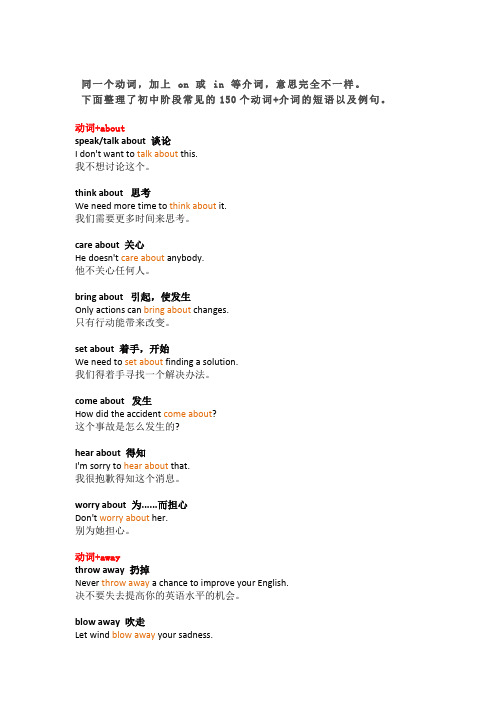
同一个动词,加上on 或in 等介词,意思完全不一样。
下面整理了初中阶段常见的150个动词+介词的短语以及例句。
动词+aboutspeak/talk about 谈论I don't want to talk about this.我不想讨论这个。
think about 思考We need more time to think about it.我们需要更多时间来思考。
care about 关心He doesn't care about anybody.他不关心任何人。
bring about 引起,使发生Only actions can bring about changes.只有行动能带来改变。
set about 着手,开始We need to set about finding a solution.我们得着手寻找一个解决办法。
come about 发生How did the accident come about?这个事故是怎么发生的?hear about 得知I'm sorry to hear about that.我很抱歉得知这个消息。
worry about 为......而担心Don't worry about her.别为她担心。
动词+awaythrow away 扔掉Never throw away a chance to improve your English.决不要失去提高你的英语水平的机会。
blow away 吹走Let wind blow away your sadness.让风吹走你的悲伤。
carry away 拿走,使入迷You should carry the rubbish away at once. 你应该立刻把垃圾带走。
clear away 清除掉,消散He's got clear away.他逃得无影无踪。
die away 逐渐消失The sound died away in the distance.声音逐渐消失在远方。
初中英语介词用法总括

初中英语介词用法总括1.in序号功能含义理解核心典型例句1 表示时间在某段时间朝代、古今、世纪、年代、年、季、月、星期、早、下午、晚上、过去、将来等不具体的、模糊的大于1天的时间段。
(注意和at在这方面的区别:at指的是短于1天的时间点)in Tang dynasty;in the 19th century;in 1980;in this year;in spring;in a week;in a month;in the morning2 表示位置在某个地方国家、地区、省、市、区、太空、天空等…(自然意义上的地方)in china;in huabei;in Beijing;in the sky在某个场所车、教室、超市等(注意和at在这方面的区别,at一般用在:家、角、店、站、口等可能有和露天接触的地方)in the train;in the classroom;甲处于乙中…除实物里面外,注意“光、灯、影、树荫、雨、森林”,有全身置入某种环境之中的含义在内。
We are in the classroom;They are sitting in the shade of atree;They are studying in thebrightlight.3 表示将来在…以后用在一般将来时中,是从“现在时间点往后..”They will come back in 10 days4 语言单位材料/关于“材料“,注意和with在这个用法上的区别。
(with偏向“工具”,in偏向“材料”)I wrote a novel in Russian;Thelength is measured in meter, andcentimetre;This board was castin gold.5 状态方面服饰/状态:既可以指人的状态,也可指物的状态;方面:既可指具体,也可指抽象方面;服饰:尤以颜色和状态常考He wasn’t in good health,so talk inlow voice. Our country inrich in naturalresources; A good teachermust be an example in study He isin red shoes today初中阶段应掌握的In的常见短语介词短语in all 总计;in general 一般来说;in time 及时;in advance 事前;in themeantime 与此同时;in place 适当地; in the hope of怀着……希望;inconnection with 和……有关;in contact with 和……联系;in addition to学习好资料欢迎下载。
- 1、下载文档前请自行甄别文档内容的完整性,平台不提供额外的编辑、内容补充、找答案等附加服务。
- 2、"仅部分预览"的文档,不可在线预览部分如存在完整性等问题,可反馈申请退款(可完整预览的文档不适用该条件!)。
- 3、如文档侵犯您的权益,请联系客服反馈,我们会尽快为您处理(人工客服工作时间:9:00-18:30)。
表示方位的介词:in, to, on
1. in 表示在某地范围之内。
如:Shanghai is/lies in the east of China.上海在中国的东部。
2. to 表示在某地范围之外。
如:Japan is/lies to the east of China.
日本位于中国的东面。
3. on 表示与某地相邻或接壤。
如:Mongolia is/lies on the north of China.蒙古国位于中国北边。
表示计量的介词:at, for, by
1. at表示“以……速度”“以……价格”
如:It flies at about 900 kilometers a hour.它以每小时900公里的速度飞行。
I sold my car at a high price.
我以高价出售了我的汽车。
2. for表示“用……交换,以……为代价”如:He sold his car for 500 dollars.
他以五百元把车卖了。
注意:at表示单价(price) ,for表示总钱数。
3. by表示“以……计”,后跟度量单位
如:They paid him by the month.
他们按月给他计酬。
Here eggs are sold by weight.
在这里鸡蛋是按重量卖的。
表示材料的介词:of, from, in
1. of成品仍可看出原料
如:This box is made of paper.
这个盒子是纸做的。
2. from成品已看不出原料
如:Wine is made from grapes.
葡萄酒是葡萄酿成的。
3. in 表示用某种材料或语言
如:Please fill in the form in pencil first.
请先用铅笔填写这个表格。
They talk in English.
他们用英语交谈。
注意:in指用材料,不用冠词;而with指用工具,要用冠词。
如:draw in pencil/draw with a pencil
表示工具或手段的介词:by, with, on
1、by用某种方式,多用于交通
如by bus乘公共汽车,by e-mail. 通过电子邮件。
注意:表示搭乘交通工具时,用by时不用冠词,用in时要用冠词。
如:I went there by bus/in a bus.
我是坐公共汽车去的那儿。
2. with表示“用某种工具”
如:He broke the window with a stone.
他用石头把玻璃砸坏了。
注意:with表示用某种工具时,必须用冠词或物主代词。
3. on表示“以……方式”,多用于固定词组
They talked on the telephone.
他们通过电话进行交谈。
She learns English on the radio/on TV.
她通过收音机/电视学英语。
表示关于的介词:of, about, on
1. of 仅是提到或谈到过某人或某事
如:He spoke of the film the other day.
他前几天提到了这部影片。
He thought about this matter yesterday.
他昨天考虑了这件事。
2. about 指“关于”某人或某事物的较详细的情况
如:Can you tell me something about yourself?
你能告诉我一些关于你自己的事情吗?
3. on指“关于”学术性的或严肃的事
如:It’s a textbook on the history of china.
它是一本有关中国历史的教科书。
表原因或理由的介词:for, at, from, of, with, by, because of
1. for表示原因,常与sorry, famous, punish, praise, thank, blame等词连用
如:I am sorry for what I said to you.
我后悔不该对你讲那些话。
2. at指情感变化的原因,意为“因听到或看到而……”
如:He was surprised at the news.
听到这消息他大吃一惊。
3. from指“外在的原因”,如受伤、车祸等
如:He died from the wound.
他因受伤而致死。
4. of指“内在的原因”,如病、饿等
如:The old man died of hunger.
老人死于饥饿。
5. with 指生理上或情感上的由外界到内心的原因
如:Hearing the news, he jumped with joy.
他们听到这个消息,欣喜若狂。
He was shaking with anger.
他气得浑身发抖。
6. by 表示外部的,尤其是暴力的或无意中造成某种结果的原因
Her body was bent by age.
他因年老背弯了。
She took your umbrella by mistake.
我因弄错拿了你的雨伞。
7. because of 表示引起结果的直接原因
如:He retired last month because of illness/because he ill.
8. owing to 多表示引起某不良后果的原因
如:Owing to the rain they could not come.
由于下雨他们没来。
9. thanks to 表示引起某种幸运结果的原因,常译为“幸亏……,多亏……”如:Thanks to John, we won the game.
多亏约翰,我们才赢了这场比赛。
10. out of 表示动机的起因,常译为“出于……”
如:He asked the question out of curiosity.
他出于好奇才问了那个问题。
11. through多表示因局部而影响全局的原因
如:The war was lost through bad organization.
战争因组织不周而失败了。
表示好像或当作的介词:like, as
1. like表示“像……一样”,其实不是
如:Peter the Great, like his country, was strong and proud.
彼得大帝像他的国家一样强健和自豪。
2. as表示“作为,以……身份”,其实也是
如:He talked to me as a father.
他以父亲的身份跟我谈话。
注:as作连词时,可表示“好像……”。
如:The work is not so difficult as you imagin.
这工作不像你想像的那么困难。
表示支持或反对的介词:against, for against反对,for支持,互为反义词。
如:Are you for my idea or against it?
你赞同还是反对我的想法?
表示除某人某物外的介词:besides, except
1. besides是包括后面所提人或物在内的“除……外,还”
如:Thirty students went to the cinema besides him.
除他以外,还有30个学生去看了电影。
(他和另外30人都去了)
He is interested in tennis besides(=as well as)football.
除了足球,他还对网球感兴趣。
2. except是指不包括后面所提人或物在内的“除去”
如:Everyone is excited except me.
除我以外的每个人都很激动。
(他们激动,而我却不激动)
All the visitors are Japanese except him.
除他以外的所有游客都是日本人。
(其他人是日本人,可他不是)
注意:(A) except通常与表示全体的all, every连用;若与other连用,只能用besides。
如:He had other people to take care of besides me. 除我之外他还要照顾别人。
(B) except是排除同类;而except for是排除非同类,常在说明基本情况后,从细节上加上修正。
如:The composition is very good except for a few spelling mistakes.除了几处拼写错误之外,这篇作文整体还是不错的。
(作文与拼写错误是非同类的)
但except for也可代替except,特别是在句首时,因为except是不能用于句首的。
如:Except for George, you can all go.
除乔治外,你们都可以去。
